For all its extraordinary visual splendor, Assassin’s Creed Origins is ultimately an ordinary video game. That’s not such a bad thing, particularly if you like looking at pretty vistas and watching numbers go up.
Origins is the 10th main entry in Ubisoft’s series of historical murder games. It is also the latest in the current crop of uber-open world games, less of a structured collection of escalating challenges and more of a receptacle for a Nilesque river of capital-C Content.
Each of its sprawling panoramas is loaded with forts to conquer, sidequests to complete, collectables to uncover, and vantage points to ascend.
I spent more than 30 hours finishing the main storyline, but could easily spend another 30 just exploring and messing around. In those first 30+ hours, I rarely found myself doing something I hadn’t already done in many other games.
I hid in tall grass and whistled to attract patrolling guards. I visited a blacksmith to upgrade my sword. I entered an arena and fought off waves of enemies. I also climbed the Great Sphinx of Giza, of course. You can’t climb the Great Sphinx of Giza in most video games.
All Assassin’s Creed games are defined by their historical setting. This one’s set in Egypt in the era of Cleopatra, around a half-century before B.C. became A.D.
True to the name, Origins sets out to illustrate the origins of the Assassin’s order that we’ve been following from the Crusades in the Holy Land (2007’s Assassin’s Creed) all the way up to Victorian-era London (2015’s Assassin’s Creed Syndicate).
That last game was cutting so close to modern times that the series creators at Ubisoft evidently decided it was time to break the sequence and jump waaaay back in time.
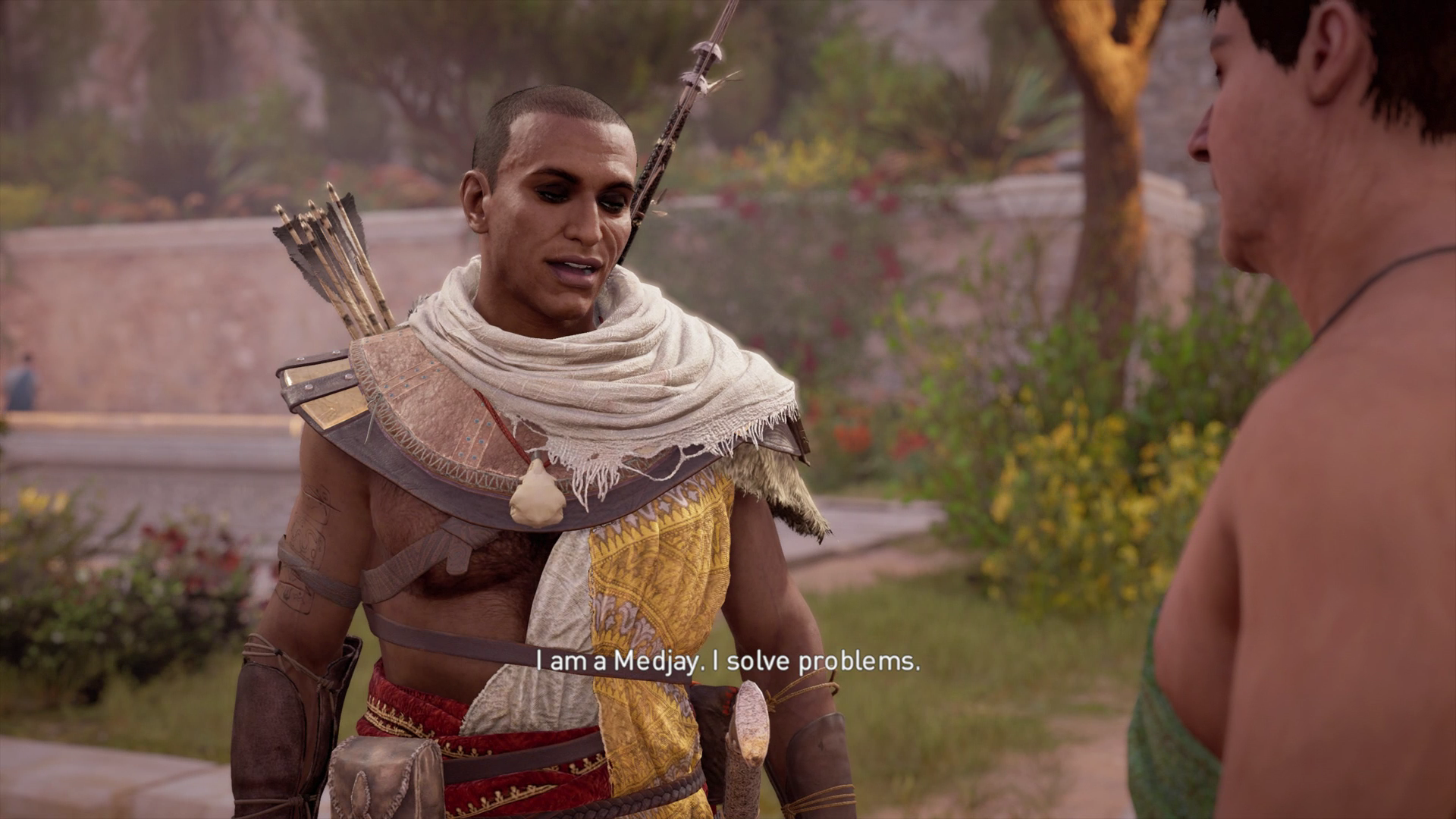
Origins tells the story of Bayek, a man who occupies the role of “medjay” in a region of Egypt called Siwa. The game depicts a medjay as a sort of all-purpose helping hand, a combination constable and social worker tasked with aiding anyone who may need it. It’s an ideal role for a video game protagonist.
As medjay, Bayek explores the game’s vast open map, helping the many (many, many) people who ask. Origins drops you right into the action and quickly falls into a predictable, even soothing rhythm: you reach a new area, and take in the sights.
You look at your map and find all the sidequests in that region. One by one, you complete those quests, each of which involves some variation of sneaking, assassinating, or fighting.
As you progress, your level will slowly climb, your gear will slowly improve, and you’ll unlock better and better abilities. Before long, you’ll go to a new area with higher-level enemies.
Of course, in the Assassin’s Creed tradition, you’re not actually playing as Bayek. You’re a modern-day researcher exploring history through a fully immersive VR-style technology called the Animus.
Assassin’s Creed has stepped back from the more involved present-day storylines of the earlier games in the series, and the most recent entries have paid only the faintest lip-service to the convoluted conspiracies and soapy familial plotlines established in the first few games.
Origins initially seems like it’s going to return to a more substantial exploration of the present-day stuff, but it’s ultimately content to kick the can down the road yet again.
How much that bothers you will depend on how much stock you’ve placed in the series’ evil-corporation meta-story up to this point. I’m fine treating these games more or less as standalone stories of people throughout history. The modern-day easter eggs are a bonus.
Bayek is on a quest to avenge the death of his young son, which was brought about by a group of powerful masked men he knows only by their aliases. His quest for revenge takes him far from his home in Siwa, naturally.
As it turns out — surprise, surprise! — there’s a vast conspiracy brewing across Egypt, Greece and Rome that will sweep up Bayek, his equally vengeful wife Aya, and all the rulers, holy leaders, and conspirators they meet along the way.
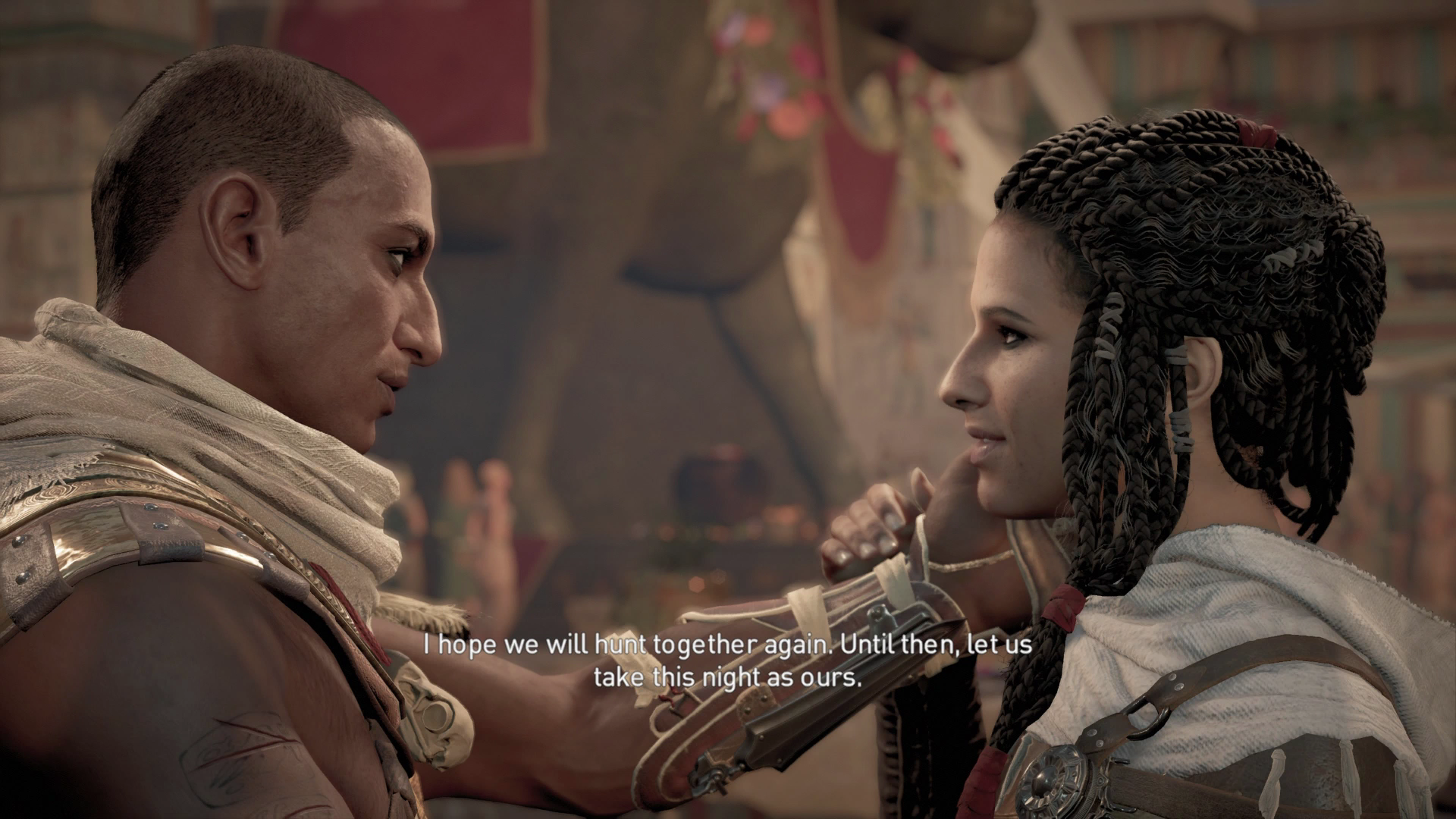
Origins‘ story struggles mightily to unite the historical with the fictional and only succeeds some of the time. Bayek and Aya form its emotional core, but for the first half of the game their relationship is only explored through act-break cutscenes separated by dozens of hours of Bayek’s lone sidequesting. By contrast, the final two acts are entirely linear, barreling through an HBO series’ worth of setpieces and historical events in just a few hours.
(A wise video game writer once told me never to complain about an open-world game’s pacing, but here I feel the complaint is justified.)
I liked how the writers depicted Bayek and Aya’s relationship — their clear passion for one another, and the different ways they were each coping with the loss of their only son. I only wish it had been given more time to breathe, particularly in those final hours.
Bayek and Aya’s story is eclipsed by the historical epic surrounding them, which I found much less interesting. I rarely had a sense of who was doing what, or which bad guy had been where, when. The men who killed Bayek’s son were all wearing masks, and Bayek must learn their identities before killing them. That makes sense structurally and adds an element of mystery to his quest for vengeance, but it hurts the story’s overall coherence.
It’s difficult to form much of a relationship with a masked villain, and they’re only unmasked immediately before they die. As the story progressed, particularly in those linear final acts, major villains were introduced and dispensed with so quickly that I had no time to form an opinion about them. Each of Bayek’s targets became just another objective marker on my screen, one more person to be stabbed or shot with an arrow.
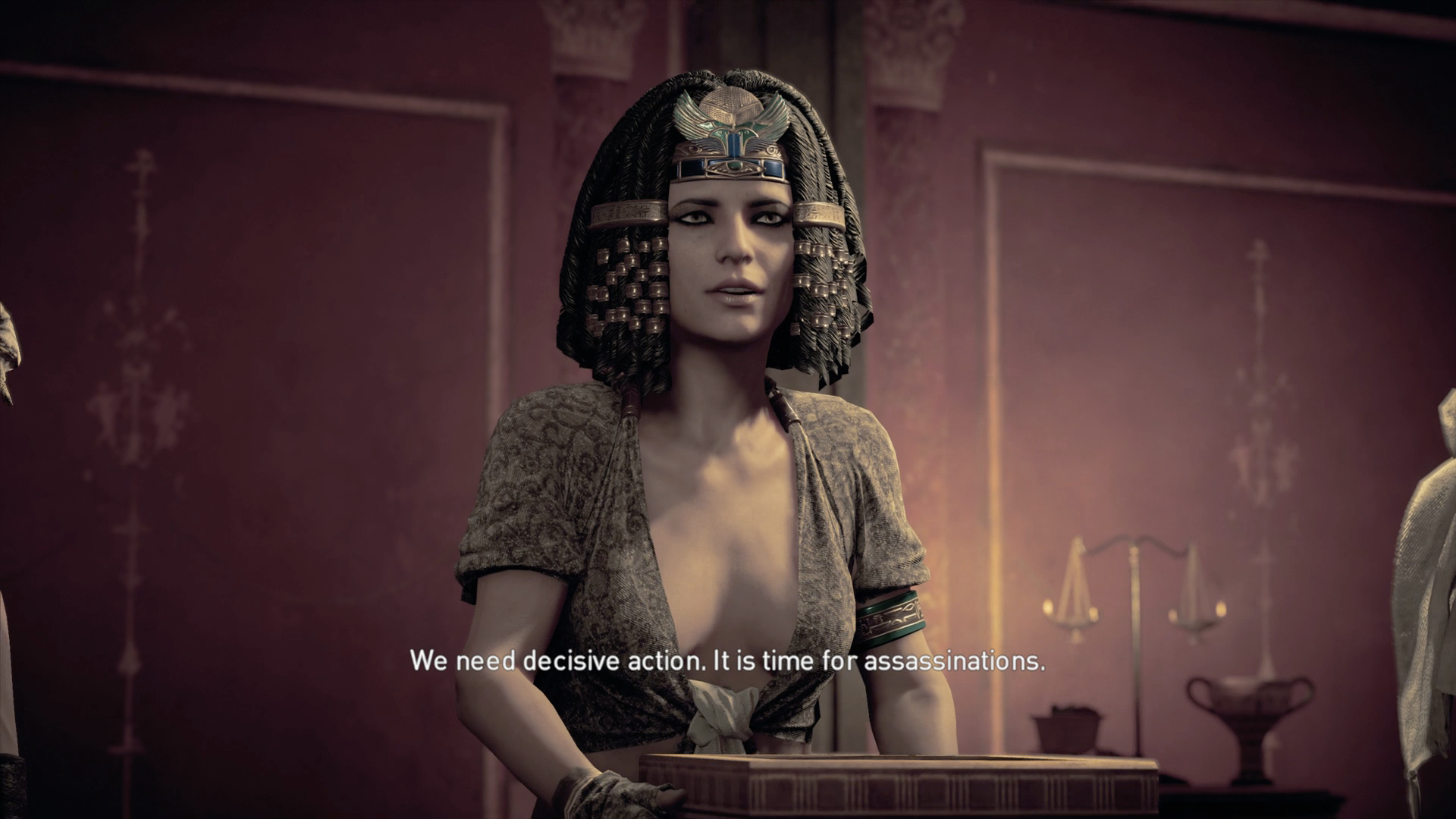
Origins fails to overcome the series’ long-standing problem establishing its heroes and villains. It aims to show the origins of the long-running conflict between the freedom-loving order of the Assassins and the power-hungry order of the Templars, but as always the distinction between the two is murky.
The most consistent villain in Assassin’s Creed games can perhaps best be thought of as history itself. That’s a hell of a villain, you know? Kind of hard to give history itself a big third-act monologue to sum the story up.
I don’t fault the writers at Ubisoft Montreal for attempting such a feat, and actually admire their ambition. Origins is an unusually sprawling game even by modern standards, with a script to match.
It’s full to the brim with characters who talk, and talk, and talk, and just when you think they’re done talking, they talk some more. In the grand tradition of open-world games, the stories get better the further you get from the main narrative.
Almost all sidequests lead to some sort of interesting twist or turnabout, and some, like the story of an ageing arena fighter or an old man who lost his book of the dead scrolls, introduce minor characters as well-written and enjoyable as anyone in the main storyline.
Many sidequests dovetail neatly with main story quests, or resolve the unfinished stories of side characters you may have met while doing grander things. The more of them you complete, the richer the narrative tapestry becomes. It’s neat.
Bayek may meet interesting people with interesting problems, but the solutions to those problems are almost invariably the same. First he’ll go somewhere and “investigate” the scene, using his enhanced eagle sense to highlight objects on the screen so you can press a button to interact with them.
Once he’s interacted with all the objects, a new objective marker appears. (In a welcome change to the series, there is no mini-map, just a compass at the top of your screen.)
You steer Bayek toward that new waypoint in order to sneak into a base and either kill someone or rescue someone. Over and over you’ll perform this same sequence of events, and the extent to which you get tired of it will likely on how much time you spend screwing around and exploring between missions.
In addition to walking around exploring, Origins mostly asks you to engage in three primary activities: climbing, sneaking, and fighting. All of that is governed by a robust new numbers-based RPG system that channels games like Destiny and The Witcher 3.
Everything in the game has a number attached to it, from Bayek’s level to his enemies’ to his individual weapons and pieces of armour. Equipment drops randomly and is categorised as common (blue), rare (purple), or legendary (yellow). You can upgrade your best equipment for a fee and keep it with you, and every sidequest you undertake rewards you with XP and the chance to get more loot.
If you’ve played an action RPG in the last five years, you’ve seen all of this before, up to and including the white numbers that pop off of enemies (yellow for headshots!) when you damage them.
The climbing works much the same as past Assassin’s Creed games, with all the strengths and weaknesses that implies. You press a single button to jump up onto a wall, then move upward with your thumbstick. Going down is a more finicky process, and whichever way you’re going, it can be a trick to get Bayek to go where you want him.
Climbing in Origins feels less like you’re taking direct control and more like you’re making suggestions, as though you’re coaxing an artificial intelligence to do an approximation of what you want.
It works well enough most of the time, but boy, can it be frustrating when it fails. I lost count of the number of times I was trying to elegantly get Bayek down off a wall and into some bushes without being noticed, only to have him awkwardly mantle around some pillar or other and get spotted.
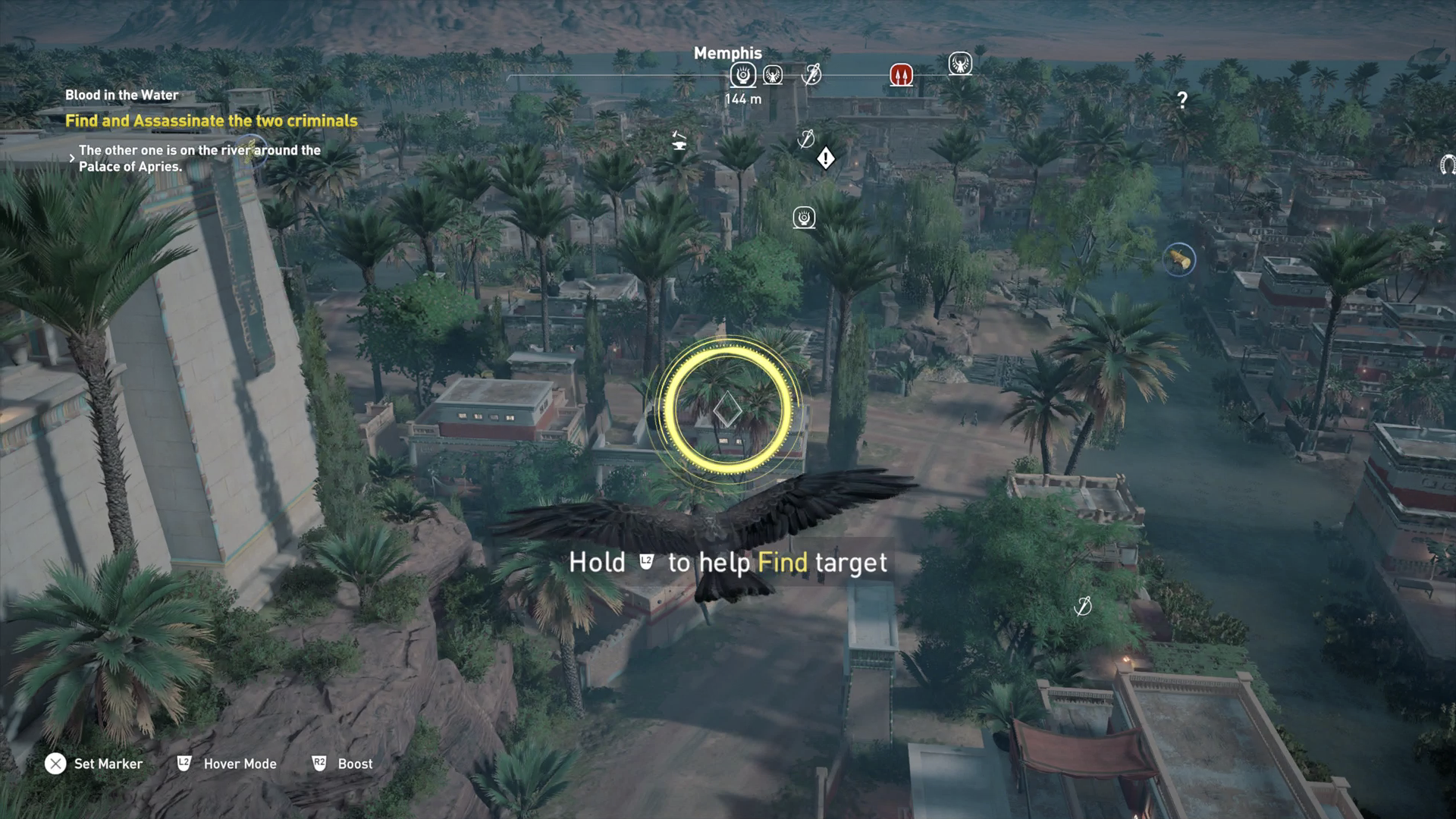
You will do this so, so many times.
Sneaking, too, will all be familiar to Assassin’s Creed veterans. With a press of a button Bayek enters stealth mode. He moves around low to the ground, creeping through tall grass and luring enemies to his position for a quick takedown.
Most of the game takes place outdoors, and at any moment, you can press a button and zoom up to a literal eagle-eye view courtesy of Bayek’s pet eagle Senu. (Bayek is evidently a warg, gifted with the mystical ability to see through the eyes of his spirit animal.)
With an overhead view of the situation, it’s much easier to plan your next move. It’s an idea that’s already been explored in other Ubisoft games like Watch Dogs 2 (an aerial drone) or Far Cry Primal (an actual bird), and it works.
Sneaking is functional and even fun to a point, and when things are going smoothly the game gives that familiar, empowering stealth-game feeling of slowly clearing out an enemy base without raising any alarms.
However, the stealth often conflicts with Origins‘ aggressive levelling system, which puts Bayek at a severe disadvantage when taking on higher-level enemies. If you attempt to sneak into a base that’s at your level or slightly above it, you may find yourself unable to one-shot enemies with your bow or even your deadly assassin’s blade.
That makes it impossible to thin the enemy ranks without someone sounding the alarm, which can leave you needing to complete your objective with zero bloodshed (often nearly impossible due to the way levels are designed) or just leave and come back when you’re higher level.
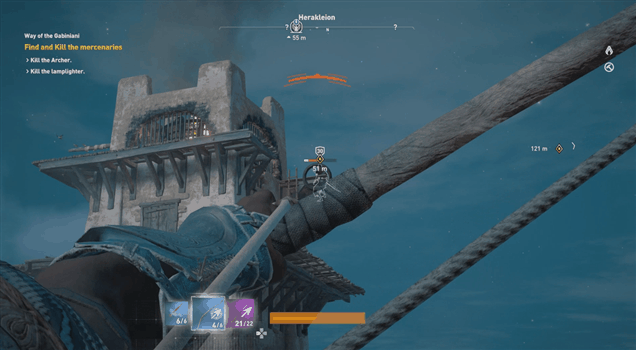
One of the most enjoyable upgrades in the game lets you manually control your sniper arrows in flight.
When you’re spotted — and you will be — you’ll have to either fight or flee. Choose to flee, and Origins‘ weirdo artificial intelligence will quickly make itself known. Enemies will run around like panicked fools, losing and gaining sight of you almost at random.
There’s a loose unpredictability to the guards that I frequently found frustrating, and at times it even felt like the game was unfairly nudging alerted patrols toward my concealed my position.
I once cheesed my way through a high-level military base by staying in stealth-mode and leading my enemies on an endless chase in circles around the base while I slowly completed objectives.
The only thing missing was some yakety sax.
If you stand your ground, Bayek will draw his weapon and shield and take on his opponents directly. Assassin’s Creed Origins has changed combat significantly compared with past games in the series, though it hasn’t quite found a comfortable new groove.
The new system focuses more on one-on-one fights, pulling the camera in to Bayek’s shoulder and asking players to dodge, parry, and attack with much less aid from the game behind the scenes.
Bayek isn’t as magnetised to his enemies as previous Assassin’s Creed protagonists were, so if you don’t close in on an enemy before pressing the attack button, you’ll hit air.
It’s a much more skill-based system than past games in the series, though nowhere near as clean or fair as the games from which it seems to be drawing inspiration.
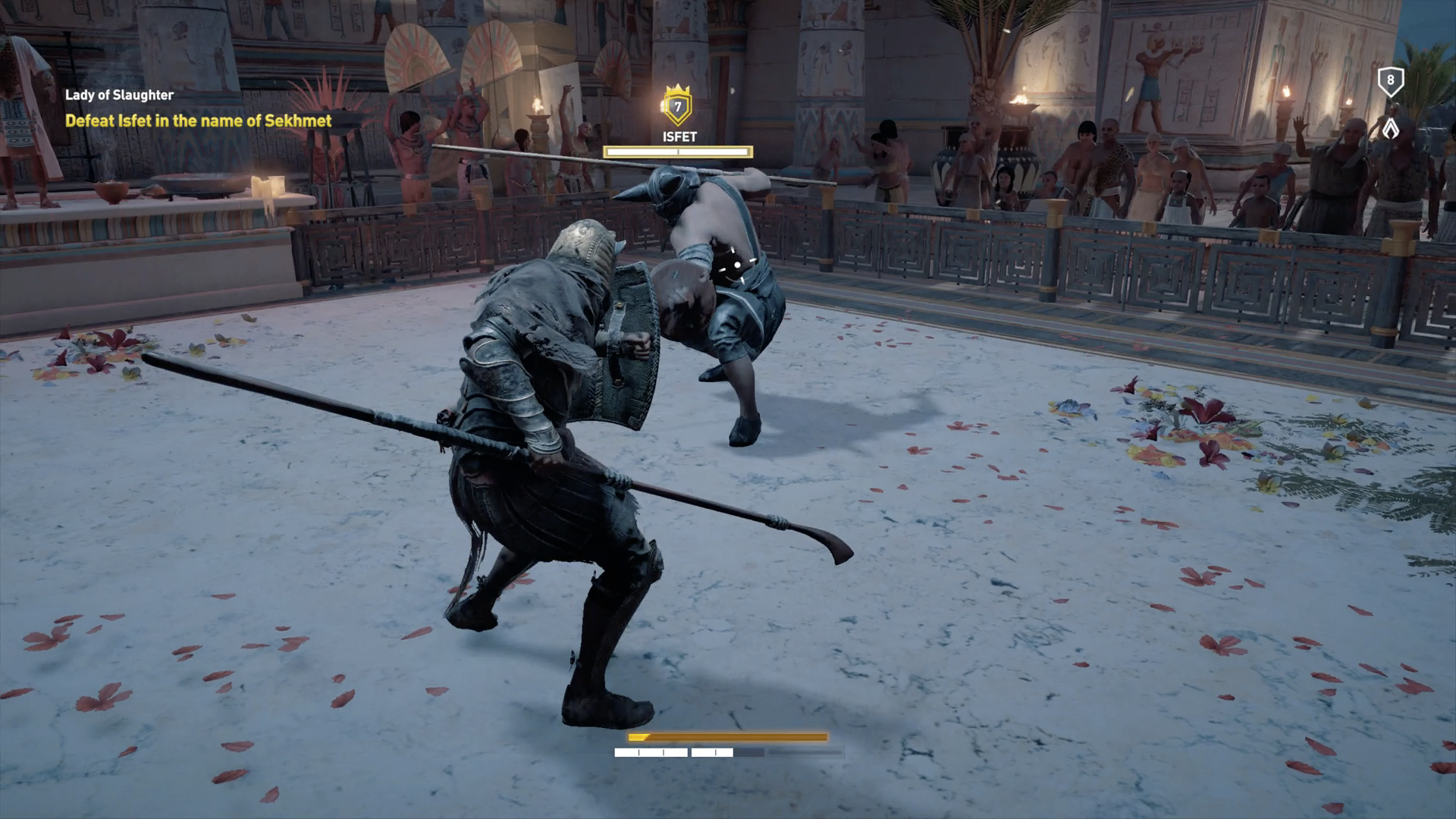
While more involved and challenging than its predecessors, Origins‘ redesigned combat never really gelled with me. I love hitbox-based melee combat games like Dark Souls, Bloodborne and most recently Nioh, but Origins falls short of those games’ rigid commitment to locked animations, stamina management, and stringent hit registration.
Bayek lacks the mobility required to quickly close with his enemies, and his dodge move often feels slow and inconsistent.
Bayek, on the other hand, automatically transitions between “normal” mode and “combat” mode whenever the game deems it time to fight. While in combat mode, he moves much more slowly and holds his shield in front of him.
There’s no way to manually switch between modes, which can make it difficult to “break free” of an attacking enemy and exploit the space around you.
As a result, combat can feel rubbery and frustrating. That’s rarely much of an issue when fighting ordinary grunts, but can become a real pain during the setpiece boss showdowns that punctuate each act.
If a boss hits you, he tends to lock you in a series of unblockable attacks. That means it’s best to keep your distance, which is difficult given Bayek’s limited options for running away or quickly closing with an enemy.
Many enemies also have a tendency to begin an attack windup, then chase after you for 50 or even 30.48m before finally letting it swing. Avoiding one of those attacks can feel like trying fruitlessly to escape someone who’s been attached to you with an invisible rubber band.
I’m glad the combat designers at Ubisoft Montreal are trying something different with Origins‘ combat, and hope they continue along this trajectory in the future.
If they can drop the vestiges of past games’ arcade-y weirdness and more fully embrace the rigid but fair hitbox-based fights of Nioh and Dark Souls, they will be on solid ground. Origins‘ swordplay isn’t quite there yet.
Assassin’s Creed Origins‘ greatest success is its setting. While obviously condensed when compared with its real-life counterpart, the game’s version of ancient Egypt is stunningly rendered and eminently explorable.
For all my gripes about sneaking and fighting, when it comes down to it, these games have never primarily appealed to me on the strength of their stealth and swashbuckling. Only in a few specific instances have they drawn me in with their stories, for that matter. I’m here for the virtual tourism.
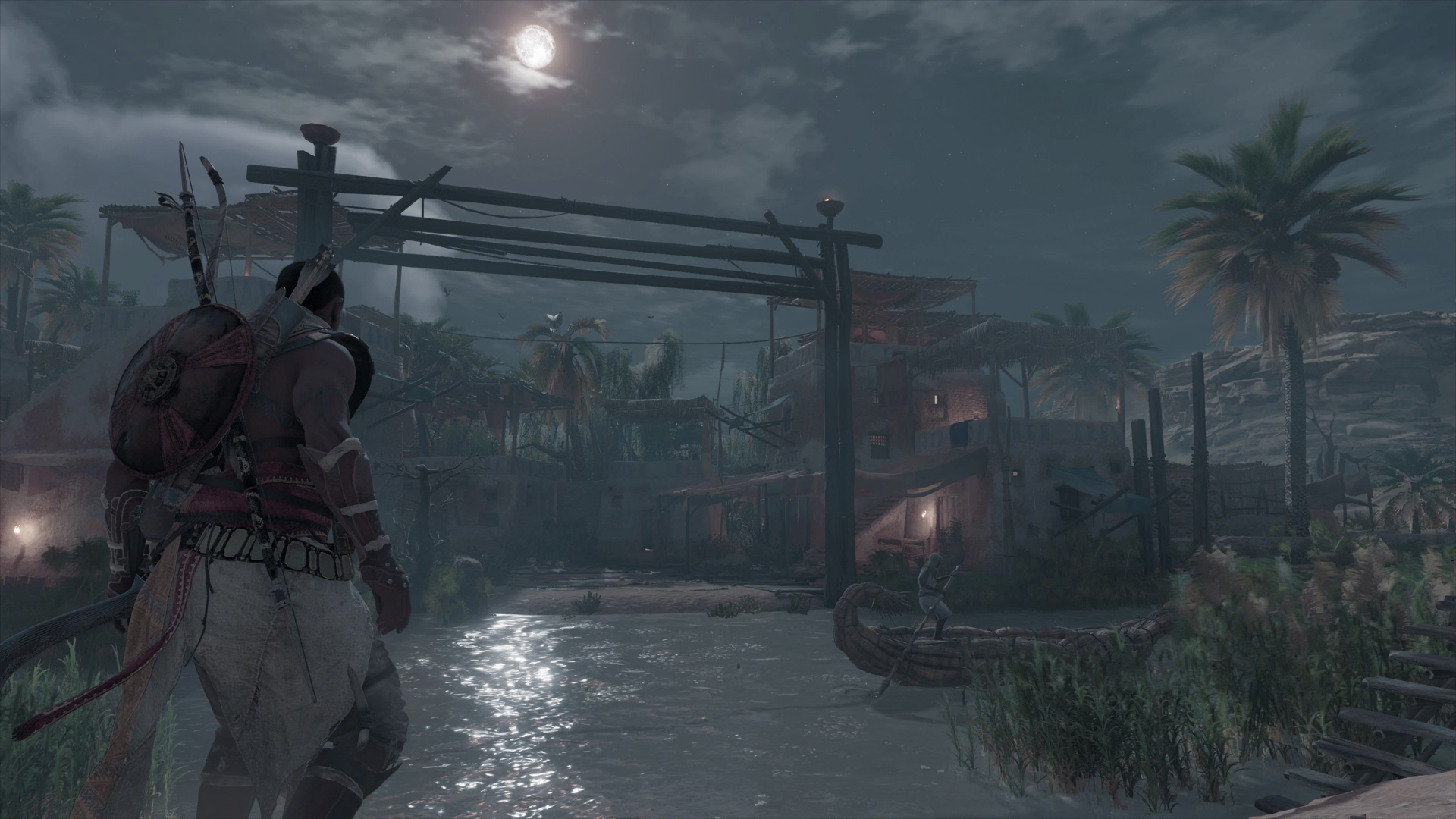
As much as I like the built-in screenshot tool, still images don’t capture how lovely this game looks in motion.
At every turn, Origins aims to dazzle the player with sumptuous vistas and visuals. I played on a PS4 Pro in 1080p resolution and was routinely struck by its beauty.
I’m sure it looks even better on a 4k TV with HDR, and better still when running on a beefy gaming PC or a powerful Xbox One X. RAM limitations and clock speeds are only part of the equation, of course, and Origins is just as much a triumph of artistry as it is of technology.
There’s something about the light in this game, the way it casts off of surfaces and seems to flow through everything around you.
The sun saturates the hazy streets of Alexandria just so. In the desert at night, the moon imbues dune and palm frond alike with a luminous glow. God, it looks good.
I’m less enamoured of composer Sarah Schachner’s musical score, which echoes the ponderous synth-dirges of past games in the series without adding much in the way of thematic development or new tonal ideas.
Austin Wintory’s lively string and woodwind arrangements from Syndicate were such a welcome burst of energy that I’d hoped the series’ traditionally mopey musical milieu may have been rejuvenated.
Turns out Wintory’s score was the exception that proves the rule. Origins returns to the series’ usual filtered synths, low drones, and portentous, reverb-drenched rebab solos.
Considering the game’s overwhelming visual beauty, its lack of a musical identity feels like a missed opportunity.
[review image=”https://i.kinja-img.com/gawker-media/image/upload/d8j1jhja0bzt5o2b8r3m.png” heading=”Assassin’s Creed: Origins” label1=”BACK OF THE BOX QUOTE” description1=”Those are some pretty pyramids.” label2=”TYPE OF GAME” description2=”Third-person historical murder sim” label3=”LIKED” description3=”An exceptionally beautiful-looking game. Exploring and uncovering secrets is a pleasure. Some well-written sidequests.” label4=”DISLIKED” description4=”Main story is a jumble. Climbing and sneaking are often awkward. The overhauled combat doesn’t quite gel. RPG leveling can feel artificially constraining.” label5=”DEVELOPER” description5=”Ubisoft Montreal” label6=”PLATFORMS” description6=”PS4 (Pro played), Xbox One, PC” label7=”RELEASE DATE” description7=”Now” label8=”PLAYED” description8=”Completed the story and a variety of sidequests and other optional stuff over the course of about 34 hours. Still have plenty left to see.”]
Before Origins, Ubisoft spent several years releasing an Assassin’s Creed game every fall like clockwork. The publisher took 2016 off, which gave Origins a full extra year in development.
It would seem that year was spent expanding the game’s world, implementing its RPG elements, and refining some fundamentals, rather than exploring the sorts of experimental new ideas for which Assassin’s Creed has become known.
From 2007 to 2015, Ubisoft’s designers pioneered new ideas in open world design, repeating and iterating on them with such frequency that the “Ubisoft open-world formula” became widely understood shorthand for certain often-ridiculed game design tropes.
With Origins, Assassin’s Creed has changed course and begun to follow in the footsteps of other games.
Each of Origins‘ big new ideas is something I’ve seen before, from the levelling and sidequest structure of The Witcher 3 to the combat of Dark Souls. There’s nothing wrong with borrowing good ideas from other good games, of course, even if Origins‘ execution of those ideas is uneven.
But I regularly felt the absence of the sorts of interesting new concepts I’d grown accustomed to from this series.
There’s nothing in Origins that’s along the lines of Brotherhood‘s recruitable followers, Black Flag‘s ship-to-ship swashbuckling and island exploration, Syndicate‘s split-protagonist storyline and grappling hook, or even Revelations‘ crowd-manipulating bombs and city takeover systems. Origins plays it safe in comparison, with scant surprises from start to finish.
If you’ve watched 30 minutes of this game, you probably have a pretty good sense of what the next 30 hours will look like.
Assassin’s Creed Origins is ungainly and uneven, beautiful and frustrating, expansive and unexpectedly conservative. It won’t challenge the palate; rather, it is a prime example of video-game comfort food.
It’s here to be slowly enjoyed, offering a seemingly endless supply of gorgeous locales and steadily-filling progress bars. If Ubisoft is a digital travel agency, Origins provides one of the most sweeping, enveloping destinations they have yet offered. Come for the beautiful recreation of ancient Egypt, stay for the beautiful recreation of ancient Egypt.
Correction: An earlier version of this review incorrectly stated that you couldn’t manually toggle between a combat and non/combat state.
Turns out, I had that wrong. You can toggle between shield mode and free-running with the left shoulder button, which does help combat feel less restrictive.
I’ve updated the review and removed a GIF of me trying to escape a buggy boss while in shield mode, since it wasn’t really a fair indication of how combat works.
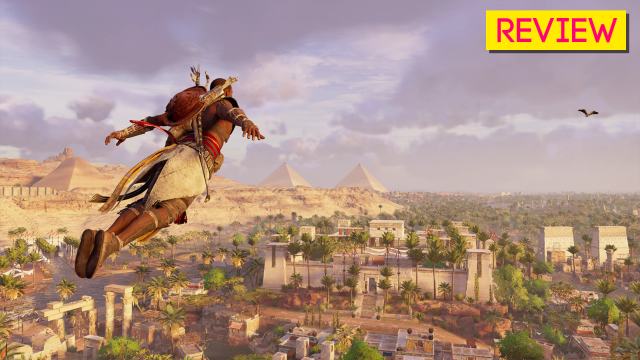
Comments
13 responses to “Assassin’s Creed Origins: The Kotaku Review”
Yeah, nah. I pretty much lost interest for the series halfway through Syndicate, just got a bit over doing the same shit over and over again. I might pick this up later on when it’s a sale item just to experience the atmosphere though.
I lost interest after Black Flag. Not that Black Flag was bad…no that game was very good. But after finishing it I pretty much concluded that that was the high point and the series can’t really do much more from there…and none of the games since then have interested me at all, so at least personally for me I was right.
Yep, really liked Black Flag but I’m one of these weirdos that loved Unity — the story and setting really affected me — once I got past all the tech issues!
Sort of how I felt hey? Especially when Unity came along and it felt fresh out of ideas? Black Flag was the pinnacle they could never come back to.
It’s unfortunate that it seems they’ve played down the middle for this one. I’ll still play it, I love desert settings and I’m betting this game will make for some great screenshot vistas.
Will be interesting to see the user reviews for this – most sites have been giving high praise of over 85%, but it sounds like the only thing that’s changed is the combat mechanics and a loot system. Also, boss fights? Has there been a boss fight in AC since the final fight in the original (if you approach it properly without getting spotted, I mean)? I don’t remember a target not going down in one hit…
Speaking of, not being able to one-shot assassinate someone because “they’re higher level”… So Abstergo have given up on investigating the past through genetic memory, and have settled for being a triple-A game developer now, cos someone in ancient Egypt shrugging off a stab through the neck is in no way historically plausible.
Bronze khopeshes can’t melt Egyptian necks. The Pyramids were an inside job.
I’ll play this one for the setting alone.
I cant wait to have more time with it, it felt good so far the parts I have seen. BUT when the very first time you hold a weapon in a tutorial there is a massively graphical glitch, which makes you float on the ground and weapon/shield float in front of you, is not the way to instil faith in a gamer.
I had a momentary Unity flashblack trauma.
I might get around to it after I’ve played Unity and Syndicate, which might be in a year or two…
The reason Ubisoft keep makin these bland as hell games is people keep buying them. Don’t be a statistic.
It just seems like they’ve forgotten what made the early games in the series so so good…
Yes the first one had problems with repetition etc, but at the time the controls & gameplay with climbing/stealthing/combat/assassinating were cutting edge/class leading, coupled with an intriguing modern day conspiracy theory that ended on one shit of a cliffhanger!
Move forward to AC2 and the gameplay was even better with the repetition fixed up, running around as Ezio was a blast, but even more than that I couldn’t wait to get back to the modern day and uncover the secrets there and discover just what was going on.
Since then, whilst there have still been decent titles (i liked brotherhood and black flag), they’ve lost sight of the modern focus, watering it down & stretching it out until it was just nonsense that most people were glad to see the back of. That lack of agency – the “why am i doing this” – combined with the incredibly aged and cluttered gameplay systems just makes the series so incredibly ‘meh’ for me now.
I bought syndicate on sale not too long ago and i just can’t stand to play it which is tremendously irritating because there’s a good game in there somewhere – the setting is good, and i at least liked that it started with a modern day preface but the gameplay was so clunky in comparison to other titles it’s painful… Back in 2007 it was the reference for so many systems but each of the elements has been superseded by other titles that i just want to play something else. I’m far from the biggest Zelda: BOTW fan as i’ve mentioned many times, however compare how Link controls/handles/climbs to an ass creed protagonist – why, with all the resources that Ubi have are they not anywhere near that level? Instead it feels like you’re constantly fighting your character to go in a certain direction and it’s been like that pretty much throughout the series. I could go on, and compare the assassinations to something like Hitman, but i won’t – i sound bitter enough already. I’m not hating on AC because it’s a drum i like to bang, more because it was one of my 3 favourite gaming series for a long time – it’s just devolved and despite the extra year seems to be mired in mediocrity and unsure on how to reach the previous series highs.
I’ve no doubt that at some point i’ll give this a try (but only when seriously discounted), but already it sounds tired and predictable – Egypt was a great choice for a setting but it sounds from the many reviews i’ve now read that they just didn’t quite know what to do with it in a narrative sense and that many of the regular AC issues are still in there (tailing missions – ugh) rearing their ugly head.
Sounds like there’s a lot I’m not going to like about this. Enemy hit points? Character levels? Ridiculous. It’s Egypt so of course I have to play it, how many games are set there after all other than Serious Sam lol. But that’s sad to hear about the music, damn sad, ACII has the single best OST of any game I’ve ever had the pleasure of hearing, it could bring me to tears, and Black Flag sounded delightfully pirate-y, why couldn’t they record something uniquely egyptian?
Looks fine, and gameplay is probably just fine, however just like all previous games, it is way to expensive, the last game I bought was Black Flag as well, like many others, they just seem to be missing the point. And in this day and age prices should be reduced not increased, I mean really $130 + just to gain access to the entire story at the time of release, pathetic.
Bit disappointed with this one. I’ve always enjoyed playing the ac games but I felt that this one dropped the better gameplay elements.
I liked the old combat with quick time counters and brutal executions. I’m also not sold on the odd rpg elements and levelled weapon drops. It just felt like too much padding.
In context I didn’t experience much of the story. The gameplay wasn’t fun and I returned it the next day.
Went back to replaying mad max instead which was a good decision
I have played all the AC games. None have equaled AC2 and that’s because it was inspired. It was a masterpiece of animation. The character was likable and interesting. The closest they came to reproducing that was Black Flag. I would rate Origins 6/10 where 5pts are for the environment. 1/2 pt for connectivity and 1/2 pt for everything else. Repetitive and unoriginal. Ironically.